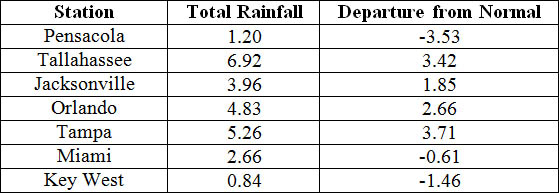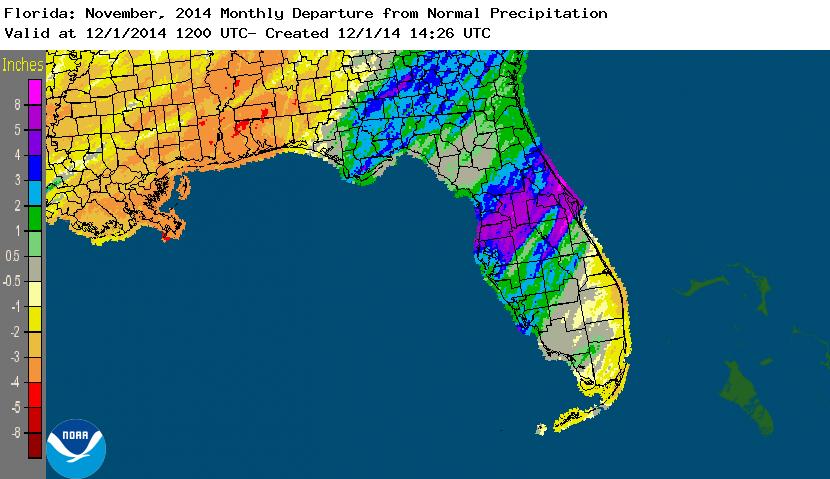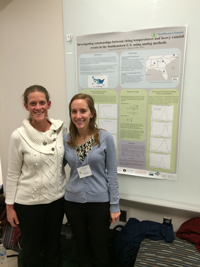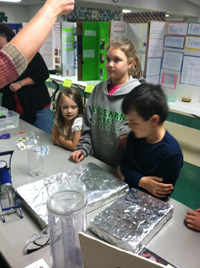Dear Florida Climate Center Friends,
We'd like to present you with the December 2014 edition of our newsletter. In this newsletter, you'll find our monthly climate summary, a list of special events that our staff attended, some pictures, and more. If you have any questions, please email us at climate@coaps.fsu.edu.
We'd also like to wish you all Happy Holidays and a Happy New Year.
Thanks,
The Staff of the Florida Climate Center
 |  |  | David Zierden
State Climatologist | James O'Brien
Professor Emeritus | Melissa Griffin
Asst. State Climatologist |
|
November Climate Summary for Florida
The Florida Climate Center's November 2014 Florida Climate Summary is now available. The summary provides an analysis of temperature and precipitation trends across the state, along with data on hazardous weather, drought, the impacts of the weather and any records tied or broken for the month. During November, average temperatures were below normal and rainfall totals were varied across most of Florida. ENSO-neutral conditions are continuing in the equatorial Pacific. The Climate Prediction Center (CPC) predicts below normal temperatures and above normal precipitation for the state through February 2015. Past summaries are archived here.
| November average temperatures and departures from normal (°F) for select cities. |  |
| November precipitation totals and departures from normal (inches) for select cities. |  |
| A graphical depiction of the monthly rainfall departure from normal (inches) for November (courtesy of NOAA, NWS). |  |
|
|
State Climatologist Speaks to Agricultural Financial Mangers
State Climatologist David Zierden was invited to speak at the 2014 Florida Agricultural Financial Management Conference on November 14th and 15th in Lakeland, Florida. The conference brought together agricultural producers, accountants, lenders, and crop insurance professionals from across the state. David Zierden presented on the risks and opportunities from varying climate patterns, especially as related to the El Niņo/La Niņa cycle. He showed how this current El Niņo event has evolved and impacted this year's hurricane season, as well as the potential for a rainy winter and spring for the State of Florida.
|
|
Southeast Climate Consortium Holds Fall Planning Meeting
The Southeast Climate Consortium (SECC) held its fall planning meeting on November 18th - 20th in Auburn, AL hosted by the Auburn University.
 The SECC is one of the Regional Integrated Science and Assessment projects sponsored by NOAA's Climate Program Office. Florida State University, along with the Florida Climate Center, is one of the eight partnership universities in the Southeast. The SECC aims to perform research and applications that further the use of climate information and forecasting in agriculture, forestry, water resource management, and other terrestrial ecosystems. The fall planning meeting is an opportunity to share progress on current projects and strategize on continuing and proposed new opportunities. Assistant State Climatologist Melissa Griffin attended the meeting and gave the group an explanation about the Polar Vortex and some of the misconceptions of the phenomena. Research assistant Lauren Zuromski was also in attendance and presented work that has been done for her Undergraduate Honors Thesis.
|
|
Out and About in the Local Community
 In early November, Assistant State Climatologist Melissa Griffin traveled to local middle and elementary schools to help judge their annual science fairs. Students from kindergarten to 8th grade participated in the school events, submitting a variety of well thought out and unique experiments. She also took part in Killearn Lakes Elementary School's Science Night, along side COAPS Outreach Coordinator Brittany Pace, teaching children and their parents how clouds form, illustrating the damage of a hailstorm and doing tricks with the power of wind. Near the end of the month, Ms. Griffin gave eight 30-minute presentations to 4th and 5th grade students at a Wakulla County elementary school. Her talk covered the basics of weather that is taught in the weather, climate and water cycle science curriculum. In early November, Assistant State Climatologist Melissa Griffin traveled to local middle and elementary schools to help judge their annual science fairs. Students from kindergarten to 8th grade participated in the school events, submitting a variety of well thought out and unique experiments. She also took part in Killearn Lakes Elementary School's Science Night, along side COAPS Outreach Coordinator Brittany Pace, teaching children and their parents how clouds form, illustrating the damage of a hailstorm and doing tricks with the power of wind. Near the end of the month, Ms. Griffin gave eight 30-minute presentations to 4th and 5th grade students at a Wakulla County elementary school. Her talk covered the basics of weather that is taught in the weather, climate and water cycle science curriculum.
|
|
FSU Family Connection Article
An article co-authored by Assistant State Climatologist Melissa Griffin appeared in the November issue of the FSU Family Connection newsletter. Ms. Griffin talks about winters in Tallahassee and how they compare to winters in other parts of the state. Working with Ms. Cindy Fernald, one of the advisory council members, they came up with some tips for parents to help prepare their students for the potential temperature changes in the upcoming months.
To read the newsletter and the article, feel free to access What's Going 'Round.
|
|
Upcoming Events
January 4-9, 2015:
Annual Meeting of the American Meteorological Society in Phoenix, AZ
January 31, 2015:
Children's Day at the Museum of Florida History in Tallahassee, FL
February 21, 2015:
FSU High Magnetic Field Lab Open House in Tallahassee, FL
|
|
Special Report: 2014 Hurricane Season Review
November 30th marked the official end to the 2014 Hurricane Season. This hurricane season only had 8 Named Storms; 6 of the 8 became hurricanes and only 2 of those 6 became major hurricanes (Category 3 or greater). There was only one storm this year that made a landfall in the United States; Hurricane Arthur made landfall in Shackleford Banks, NC on July 3rd. The forecasts at the beginning of the season predicted a quiet Atlantic Hurricane season, but the North Pacific season had one of the most active seasons on record.
To find out more about the season, you can read the official press release from NOAA.
In addition, the National Hurricane Center will be putting together Tropical Cyclone Reports for all of the 2014 storms. Once they have finalized these in-depth reports on an individual storm, it will be posted on the following website:
http://www.nhc.noaa.gov/data/tcr/index.php?season=2014&basin=atl
|
|
About Us
The Florida Climate Center is part of a three-tiered system of national, regional, and state climate offices, including NOAA's National Climatic Data Center and the Southeast Regional Climate Center. The Florida State Climatologist and other staff at the Florida Climate Center provide the following information and services to the people of Florida:
· Climate Data:
Historical weather observations for weather stations throughout the state of Florida. We are able to provide data for most stations from 1948-present.
· Climate Information:
Long-term historical averages for various stations, climate divisions, and the entire state.
· Extreme Event Records:
Information and analyses on extreme events such as freezes, droughts, floods and hurricanes.
· Special Analysis:
With their vast knowledge of El Niņo, La Niņa and climate variability, the State Climatologist and staff can offer expert insight into Florida's climate trends.
· Outreach:
Activities, presentations, and workshops that inform and educate the people of Florida about current and emerging climate issues. We also coordinate volunteers for the Community Collaborative Rain, Hail & Snow Network (CoCoRaHS).
More About Us
|
|